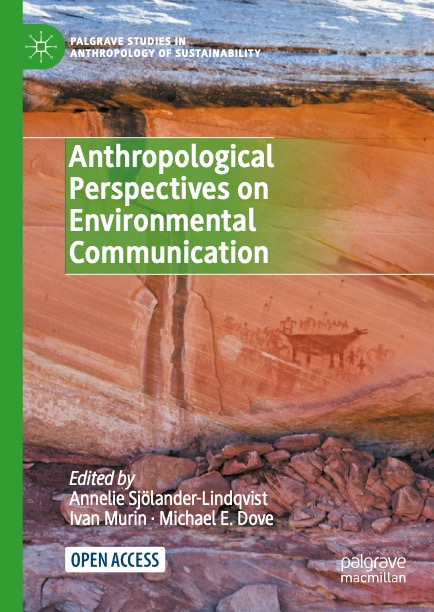An account is required to join the Society, renew annual memberships online, register for the Annual Meeting, and access the journals Practicing Anthropology and Human Organization
- Hello Guest!|Log In | Register
Anthropological Perspectives on Environmental Communication
 This book is a collection of chapters that explores and discusses the influential and pervasive role of communication on issues pertaining to the environment. Every day we read, hear, or see communication about environmental issues: in regular news media, on Facebook, through tweets, on TV, at work, at school, or at parties. While there are countertendencies and a movement that denies climate change and downplays environmental issues, the issues of climate change, loss of biodiversity, and overexploitation of natural resources continue to make up a large proportional part of the societal debate. Issues related to the environment are truly global and influence people all over the world in the contemporary epoch of the Anthropocene—but both consequences and responses to environmental crisis differ depending on local politics and local dependency on the environment, as well as cultural understandings.
This book is a collection of chapters that explores and discusses the influential and pervasive role of communication on issues pertaining to the environment. Every day we read, hear, or see communication about environmental issues: in regular news media, on Facebook, through tweets, on TV, at work, at school, or at parties. While there are countertendencies and a movement that denies climate change and downplays environmental issues, the issues of climate change, loss of biodiversity, and overexploitation of natural resources continue to make up a large proportional part of the societal debate. Issues related to the environment are truly global and influence people all over the world in the contemporary epoch of the Anthropocene—but both consequences and responses to environmental crisis differ depending on local politics and local dependency on the environment, as well as cultural understandings.
This volume of chapters was initially presented at the 2018 meeting of the Society for Applied Anthropology in Philadelphia, Pennsylvania, USA. The session “Anthropological Contribution to Environmental Communication” grew from the concern about sustainability and the wish to explore the different ways individuals and collectives experience, understand, and act upon environmental challenges. The contributions to this volume proceed from the premise that anthropology is well positioned to contribute to the study of environmental communication.
Anthropology’s focus on the holistic dimensions of the human condition , its interest in understanding humankind’s cultural variation wherever it occurs, and its sensitivity to both similarities and differences, while never losing sight of the powers of politics, ideologies, economies, and ecologies, provide a solid foundation for such a contribution. This book tries to make sense of how an anthropological perspective can further our understanding of the diversity of environmental communication and the different ways people—verbally and non-verbally—communicate about and with their surrounding environments. An important aspect lies in the discussion of the communicative prospects for sustainability, seeking to bring anthropology into more theoretically and empirically productive engagement with the study of environmental communication.

Cart
Search